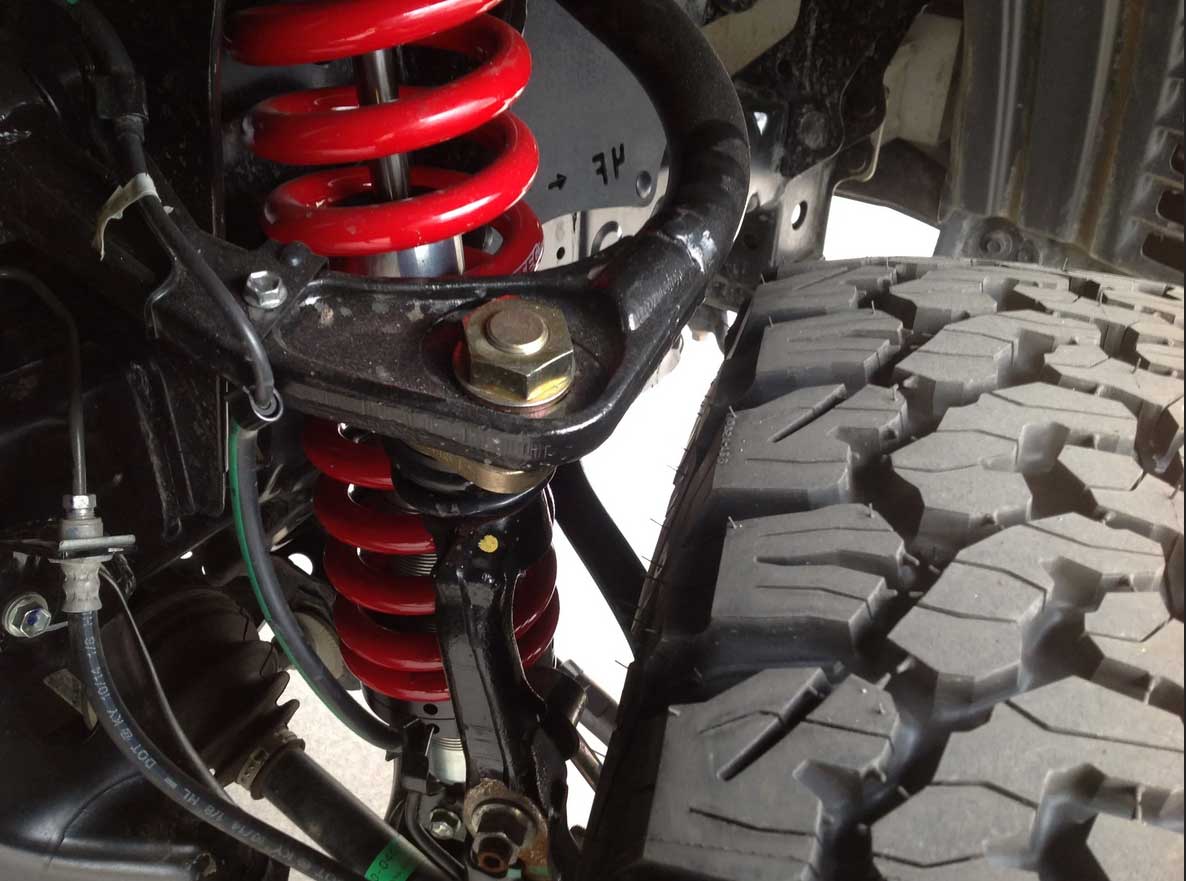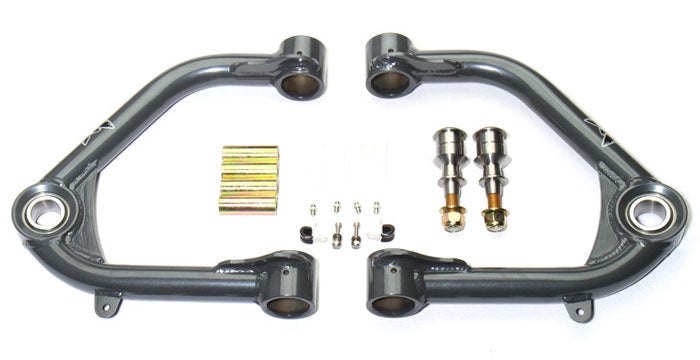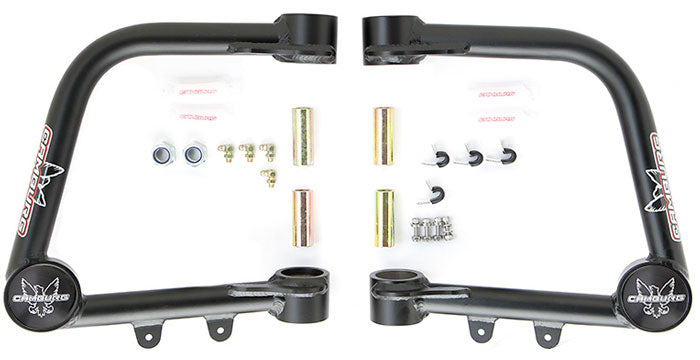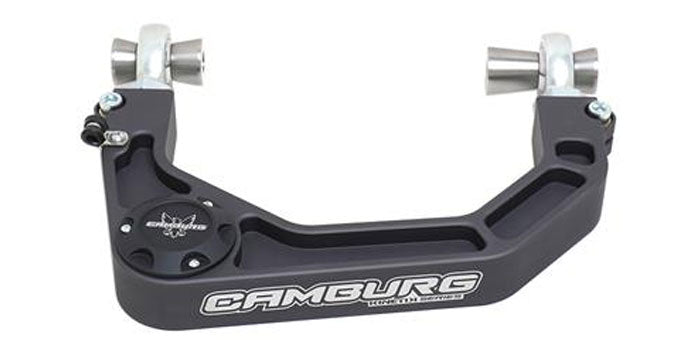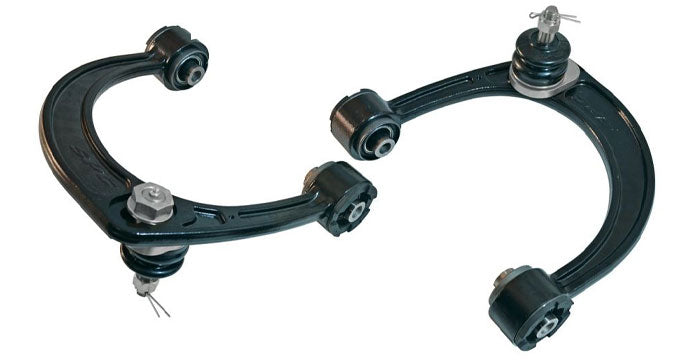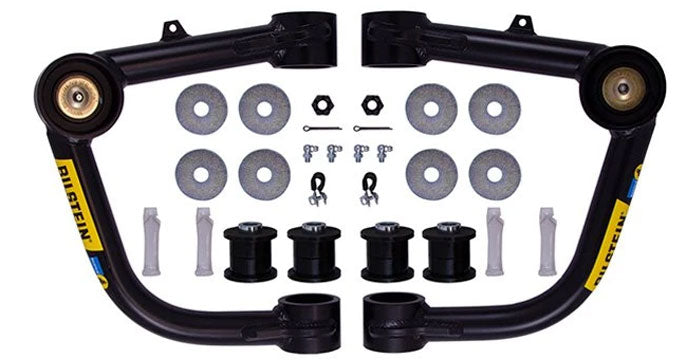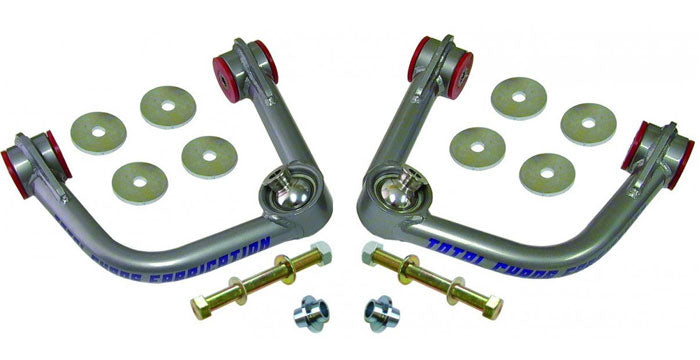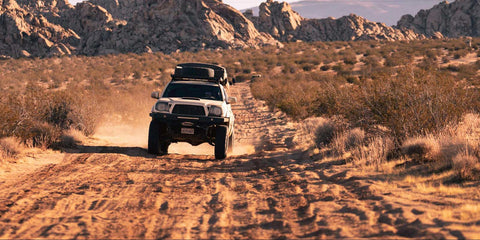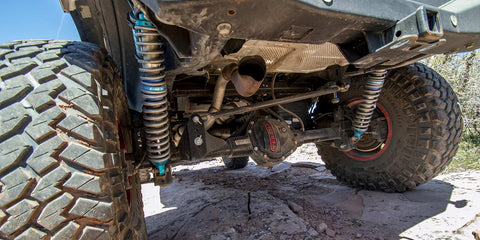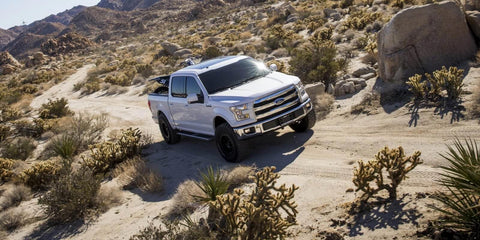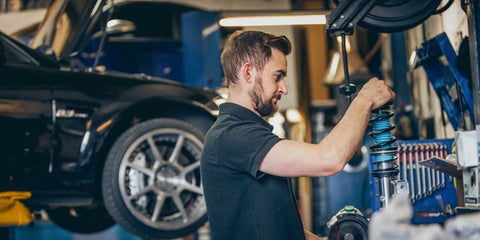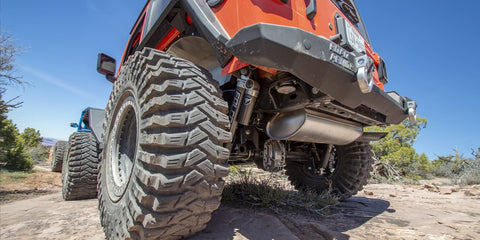The Definitive Upper Control Arm Comparison Guide
Posted by Sean Reyes on
| UCA | Build Material | Joint Articulation | Joint Diameter | Adjustability | Price |
|
OEM (Sealed Ball Joint) |
Steel (Stamped) | 68° | 1.06" | NA | ~$550 |
|
Icon Tubular (Sealed Delta Joint) |
Steel (Tubular) | 75° | 1" | NA | $799.95 |
|
Icon Billet (Sealed Delta Joint) |
Aluminum (Billet) [Lightest] | 75° | 1" | Heim Adjustment1 | $1354.95 |
|
Pro Comp Uniball (capped top, open bottom) |
Steel (Tubular) | 68-72° | 1" | NA | $681.96 |
|
SPC (Sealed/Greaseable Ball Joint) |
Steel (Forged) [Heaviest] | 80° | 1.42" | Camber/Caster Individually Adjustable at Ball Joint2 | $629 |
|
Camburg Performance Uniball (Capped Top, Open Bottom) |
Steel (Tubular) | 70-74° | 1.25" | NA | $849 |
|
Camburg Performance X-Joint (Sealed/Greaseable Ball Joint) |
Steel (Tubular) | 72-76° | NA | NA | $699 |
|
Camburg Kinetic (Capped Top, Open Bottom) |
Aluminum (Billet) | 70-74° | 1.25" | 2 degrees caster at heim misalignment spacers/Camber & Caster at heims themselves1 | $1499 |
|
Old Man Emu (Sealed/Greaseable Ball Joint) |
Steel (Tubular with forged eyelets/ ball joint housings) | 72-76° | NA | NA | $548 |
| Bilstein B8 (Sealed/Greaseable Ball Joint) | Steel (Tubular) | 72-76° | NA | NA | $655 |
|
Total Chaos Urethane Pivot (Open Uniball) |
Steel (Tubular) | 68-72° | 1" | NA | $834 |
| Total Chaos | Steel (Tubular) | 68-72° | 1" | Heim Adjustment | $1094 |
|
Heim Pivot (Open Uniball) |
(Camber/Caster)1 |
Note 1: Icon Billet camber and caster adjustment achieved by extending or shortening heims joints. Camber and caster corrected simultaneously creating some limitation in maximum adjustment.
Note 2: SPC has 7 positions for caster. There is a separate slide adjustment for +/-2 degrees camber.
Old Man Emu
Old Man Emu’s heavy-duty upper control arms are constructed of a tubular design with forged eyelets and ball joint housings. They include a high angle heavy-duty ball joint that is sealed and greaseable on both ends as well as their patented maintenance-free free pivoting GIIRO bushings. Although not adjustable, they are optimized for around 2” of lift with an increase of 2.5-3.5 degrees of positive caster and up to 1.5 degrees of negative camber. Upgrade your off-road experience with Old Man Emu upper control arm. Enhanced durability and performance for your adventurous journeys.
Icon Delta Joint Tubular
Although billed as their more budget-oriented arm, the Icon Tubular upper control arms still feature Icon’s industry-leading Delta Joint ball joints. These greaseable joints use a fully sealed zinc plated housing with stout metal on metal internals combining the bind-free performance of a uniball with the durability of a ball joint. Their tapered and notched pins also allow for some of the most articulation on the market and the tubular arm design is relatively lightweight and decently strong. Even though they are designed for use with Icon’s coilovers and shocks, these upper control arms do have enough caster and camber built in to correct for higher lift heights as well.
Icon Delta Joint Billet
Featuring an incredibly lightweight and bulletproof billet aluminum construction as well as PTFE-lined FK rod ends, the Icons Billet upper control arms offer maximum performance with relatively minimal compromises. Their patented Delta Joint heavy-duty high angle ball joints allow for smooth bind and deflection free performance and stellar durability, while the machined adjuster sleeves for the massive ¾” FK rod ends allow for a greater range of camber and caster adjustment.
Camburg Performance Uniball
Now featuring a sealed billet aluminum top cap for better protection from contaminants, Camburg’s newly redesigned tubular Performance Uniball arms offer race-level performance and durability at a more reasonable price than some of their other arms. By replacing the factory ball joints with massive 1.25” PTFE lined FK uniballs, these offer more useable travel with less bind and deflection for the most strength and performance in extreme conditions. These arms will not only correct for camber and caster on 1-3” lifts but will also improve your suspension geometry as well.
Now featuring a sealed billet aluminum top cap for better protection from contaminants, Camburg’s newly redesigned tubular Performance Uniball arms offer race-level performance and durability at a more reasonable price than some of their other arms. By replacing the factory ball joints with massive 1.25” PTFE lined FK uniballs, these offer more useable travel with less bind and deflection for the most strength and performance in extreme conditions. These arms will not only correct for camber and caster on 1-3” lifts but will also improve your suspension geometry as well.
Camburg Performance X-Joint
Although known for their race-level parts, Camburg is well aware that not everybody is up for some of the additional headaches that race-level parts require. To better serve daily drivers and weekend warriors they developed their X-Joint sealed, greaseable, HD ball joints for their tubular Performance series arms. These joints are lined with rubber so they may not articulate as freely and may have a little more deflection than a uniball arm, however, their design allows them to last much longer with less maintenance and operate with far less added noise, vibration, or harshness.
Camburg Kinetic
Built using the same massive 1.25” FK uniballs as their tubular Performance series arms, Camburgs Kinetik series of upper control arms use a lightweight 6061 billet aluminum construction and humongous ⅞” Chromoly FK heim joints to create a package suitable even for the most strenuous of race conditions. Out of the box these arms generally have up to 3-3.5 degrees of positive caster built-in however by adjusting the orientation of the misalignment spacers in the heims, you can see as much as 5-5.5 degrees of caster. Like any other heim jointed arm, you still can make more finite adjustments to camber and caster by adjusting the heim joints in and out as well. Although certainly not the quietest, longest-lasting, or most maintenance-free option, not many other arms will have as little bind, deflection, or overall strength.
SPC/Eibach/Light Racing Adjustable
Without a doubt, the most well-engineered ball joint style arm on the market, the SPC adjustable arms take a very different approach to providing performance, longevity, and adjustability that far surpasses their price point. Instead of using a more traditional tubular steel or billet aluminum design, SPC chose to use an incredible stout forged steel design. They definitely are on the heavier side because of it, however, the forged steel design allows them to build an arm that is nearly indestructible, in a shape that maximizes clearance and improves geometry through the entire suspensions curve. Boasting the highest articulation joint on the market at 80 degrees, SPC’s patented heavy-duty 36mm ball joint design is sealed, greaseable, and includes an internal wear spring that keeps constant preload on the joint to keep it tight even when the internal rubber casing begins to wear, allowing for the most useable travel on the market with the longest effective life. Depending on the application, these arms have around 2 degrees of positive caster built-in at their neutral position, however, they can be adjusted back to factory spec or up to 4-5 degrees of positive caster. They also offer separate adjustability for up to 2 degrees of negative and positive camber so you can achieve your desired alignment specs more easily and more precisely. They may not have as much strength at the joint as a uniball style arm, and they certainly will be prone to more deflection, however, their real-world performance and potential longevity are basically unmatched at their price. Elevate your vehicle's performance with SPC upper control arms. Precision engineering for optimal alignment and improved suspension control.
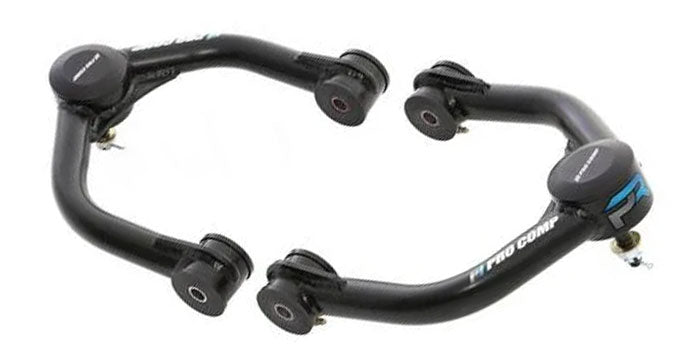
Pro Comp Uniball
If you need the performance of a uniball upper arm, don’t mind the added maintenance and NVH, and do not want to spend an arm and a leg, ProComp Uniball arms are definitely one of the best choices. Featuring a fairly strong, bind, and deflection-free 1” uniball and a simple yet robust tubular steel design, these arms will allow for excellent articulation as well as adequate alignment corrections for vehicles with 1.5-3” lifts. These definitely are not the pinnacle of arms in this list however they are more than sufficient for many of our more budget-conscious buyers.
Bilstein B8
Designed to be paired with their B8 5100, 6100, 6112, and 8112 ride height adjustable struts and coilovers, Bilsteins newly released B8 arms feature much of the same high-quality components and intelligent engineering that lends such a long and high performing life to much of their suspension. These arms are built of robust 4130 Chromoly tubing and feature sealed and greaseable heavy-duty ball joints and polyurethane bushings to create an arm that is not only strong but with the occasional greasing, will last for many years to come. By improving joint placement, and pivot angles, these arms have the range to allow for increased travel over the factory arms as well as the caster and camber correction to get your alignment back in check after you have lifted your vehicle.
Total Chaos Urethane Pivot/Heim Pivot
Many arms have come and gone since Total Chaos first started producing their tubular Chromoly arms however, their lasting power has nothing to do with luck. With 1” uniballs and enough caster and camber correction built-in for 1.5-3 inches of lift, these are a great bolt-in solution for more strength and as much as an inch more travel over stock when paired with the right coilovers. As standard these arms come with greaseable urethane bushings in the pivots for minimized deflection over factory however they offer the option to upgrade to ¾” Chromoly heim joints to completely eliminate any deflection and allow for additional camber and caster adjustment. These arms have been tried and tested on thousands of rigs for thousands of miles, so they are certainly a product you can trust.
The Shock Expert's Advice
Budget Beater - Old Man Emu
Although they are the cheapest option on this list, that does not mean they would not be a preferred option to many more expensive parts. They may not be fancy, but they have the appropriate alignment and geometry corrections needed to get your lifted vehicle back into factory spec without creating more headaches. Their sealed greaseable ball joints are pretty much noise-free and if maintained should last just as long as OEM. They lack many of the wazoo selling points of many of the other arms that are available, but they get the job done without breaking the bank.
Value Victor - SPC/Eibach/Light Racing Adjustable
It is hard to think of a better value for your dollar than SPC’s adjustable arms. They provide just about as much real-world performance as arms that are 2-3x their pay grade. Sealed and greaseable ball joints with the most articulation on the market and a wear spring to keep constant preload on the joint to keep it feeling tight even when the rubber encapsulating the inside of the joint has worn, separate camber and caster adjustment, forged steel design, the list goes on. Sure, a uniball arm with heims will have less deflection and would likely be better for the average racer or racer at heart, but in the real world, nothing is going to give you the performance or longevity anywhere near this price.
Best of The Best - Icon Delta Joint Billet
Price be damned, billet is the ticket, and Icon definitely does it best. Their Delta Joints offer all the benefits in strength, bind, and deflection-free performance of a uniball and longevity, low NVH, and low maintenance of a traditional ball joint without any of the drawbacks of either. In fact, they have more articulation at the joint than pretty much anything besides SPCs ball joints. Out of the box, Icon does set them up for a fairly high amount of positive caster, however, they still offer a fairly larger amount of camber and caster adjustments at their ¾” heims. They are not cheap, but even at their price, they are a hard package to beat.
The Definitive Upper Control Arm Comparison Guide
If you're looking to enhance your vehicle's performance, handling, and suspension, you've probably heard about the importance of upper control arms (UCAs). But with a wide array of options available in the market, choosing the best upper control arms can be a daunting task. This comprehensive guide will provide you with all the information you need to make an informed decision and help you understand the world of control arms.
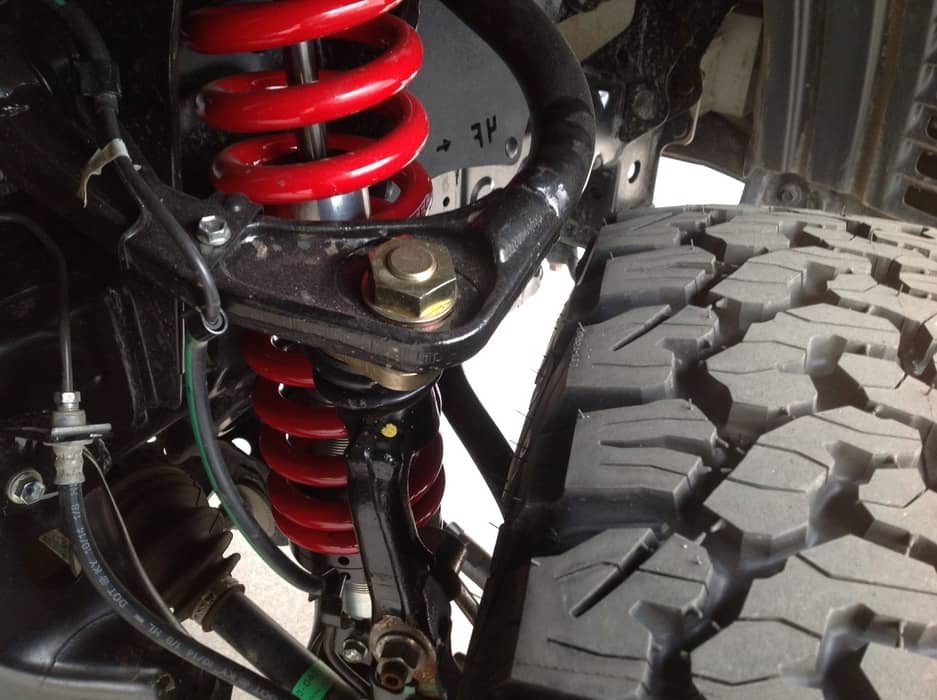
Types of Upper Control Arms
There are various types of control arms available, each with its own set of features and benefits. Understanding these types will help you make an informed choice based on your specific needs.
- Stock Upper Control Arms: These are the factory-installed UCAs that come with most vehicles. While they do their job, they often lack adjustability and strength, limiting their performance capabilities.
- Best Aftermarket Upper Control Arms: Aftermarket UCA are specially designed to offer improved performance and durability. They typically have features like adjustability, better materials, and enhanced ball joints, providing better control and handling.
- Uniball Upper Control Arms: Uniball UCAs are known for their strength and off-road capability. They feature a uniball joint instead of the traditional ball joint and control arm, which offers increased articulation and is less prone to binding.
- Billet Upper Control Arms: Billet UCAs are precision-machined from a solid block of metal, providing exceptional strength and durability. They are often used in high-performance and off-road applications.
- Kinetic Upper Control Arms: Kinetic UCAs are a type of aftermarket control arm designed for exceptional performance in off-road situations. They are known for Kinetic arm reviews for their advanced design and durability.
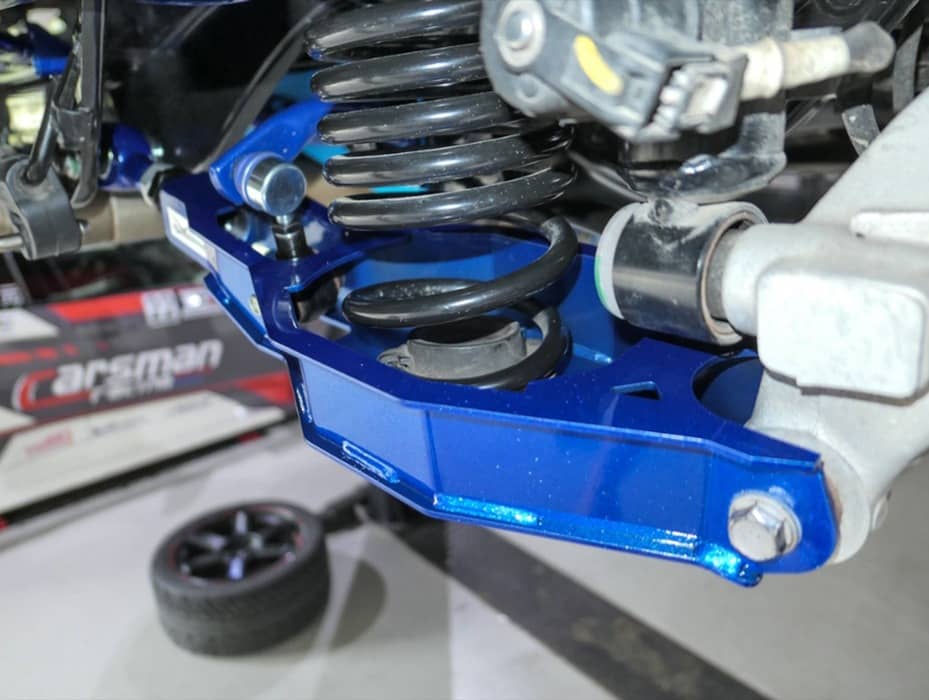
Best Upper Control Arms: A Comparison
When it comes to choosing the best control arms, there are several top contenders in the market. Each of them offers unique features, advantages, and price points. Let's take a closer look at some of the leading options:
- SPC UCA (Specialty Products Company Upper Control Arms): What is a UCA? SPC is a renowned manufacturer of best aftermarket control arms suspension components, including upper control arms. SPC UCAs are highly regarded for their adjustability, allowing you to fine-tune your vehicle's alignment and handling. These control arms are designed to fit a wide range of vehicles and are a popular choice among off-road enthusiasts.
- Camburg Upper Control Arms: Camburg Engineering is a name synonymous with off-road performance, and their upper control arms live up to this reputation. Camburg upper control arm are known for their strength and durability, making them an excellent choice for rugged off-road applications. They often feature an upper control arm ball joint that's designed to withstand the rigors of demanding terrains.
- Total Chaos Upper Control Arm: Total Chaos is another well-respected manufacturer of suspension components. Their upper control arms are designed to provide optimal strength and articulation, making them a popular choice for serious off-roaders. Total Chaos UCAs are known for their ability to handle extreme conditions while maintaining proper alignment.
- Bilstein Upper Control Arms: Bilstein is a household name in the world of suspension, known for its high-quality shocks and struts. Their upper control arms are designed to complement their shocks and struts, providing improved handling and ride quality. Bilstein UCAs are often adjustable, allowing for precise alignment settings.
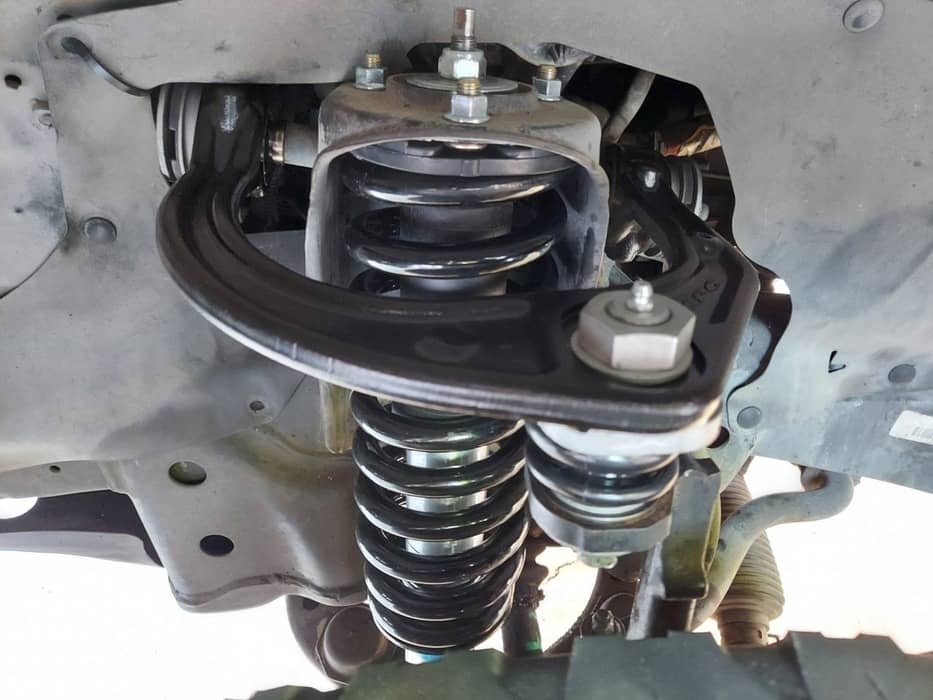
Frequently Asked Questions
What Are Upper Control Arms?
The UCA’s or Upper Control Arms job is to guide the front wheels as the suspension cycles up and down. These do not normally carry any load bearing weight and connect the frame to the knuckle and spindle where the wheel is attached.
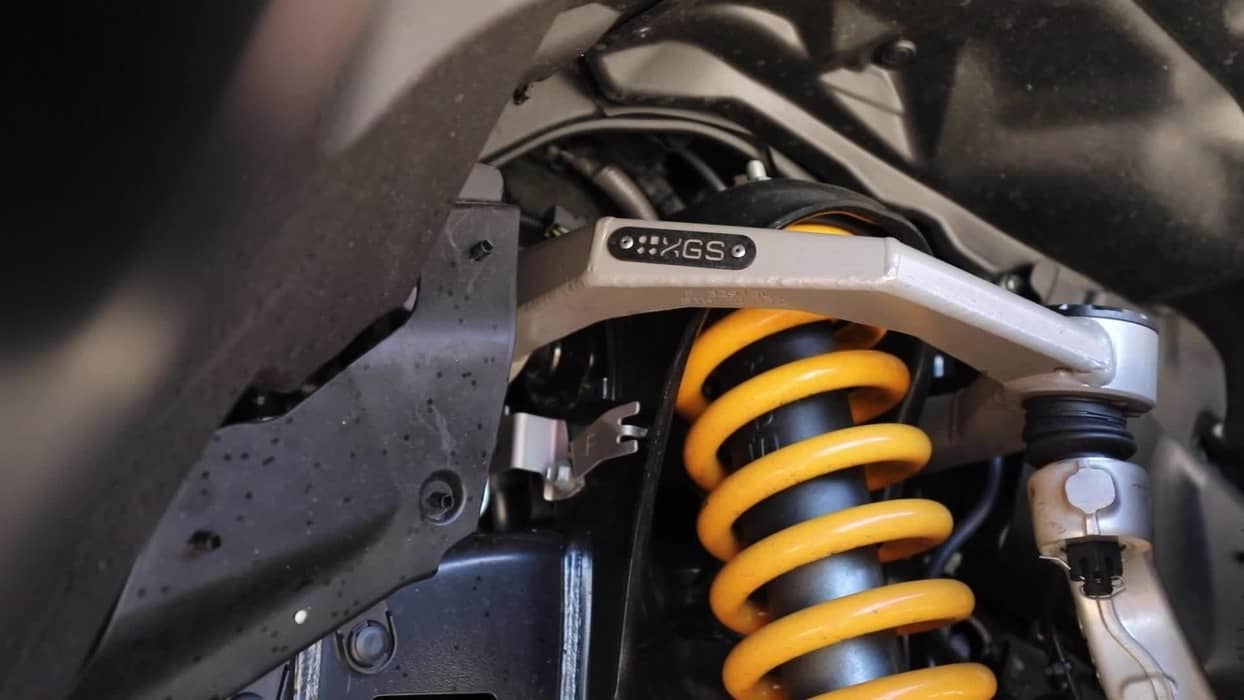
Why do I need to upgrade my UCA's
Although the factory UCA works well for a factory setting, adding lift and adding larger wheel and tires put additional stress on these components. Excessive lift can also change your suspension geometry beyond the factory UCA, and can affect everything from steering, travel, ride quality, excessive wear on joints and tires. In order to correct all of this and put your alignment back into a factory spec, an upgraded UCA is needed.
Are UCA's difficult to install?
Most UCA’s are relatively easy to install and can be done with common mechanic hand tools. This can be done by disconnecting from the knuckle and frame mounts from the UCA, and reattaching. Be sure to get alignment after installing.
Will a upgraded UCA's effect my manufacturer warranty?
As long the new UCA is installed properly, and the vehicle is aligned. There is no reason for these void you manufactures warranty.
Will I gain more travel by upgrading?
With a upgraded UCA you will be able to use retain or gain travel from the upgraded coil overs.
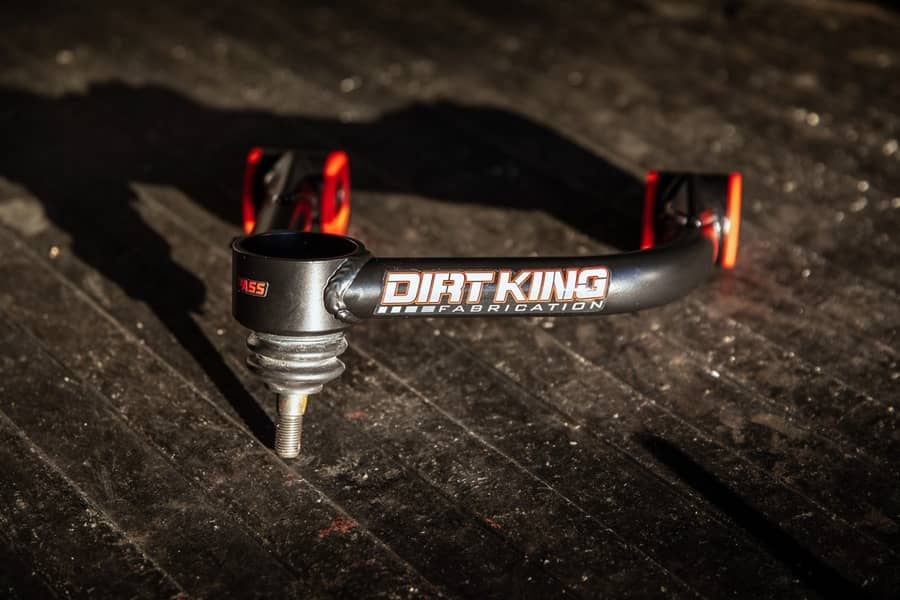
How long can I expect my new UCA’s to last?
With regular maintenance, your new UCA’s’ will last just as long if not longer than your factory UCA’s
What is the benefit of an adjustable UCA?
An adjustable UCA has the added benefit of being able to add additional camber and caster. This allows for a better alignment and increased fitment of larger tires.
What about the Lower Control Arms?
Traditionally Lower Control Arms are not upgraded but do exist for some models like Tacoma, 4-Runner, FJ, Tundra, Raptor and Silverado/Sierra.
What alignment corrections do aftermarket UCAs make?
Most aftermarket arms are going to add positive caster and negative camber to correct for the alignment change created from lifting the front of your vehicle.
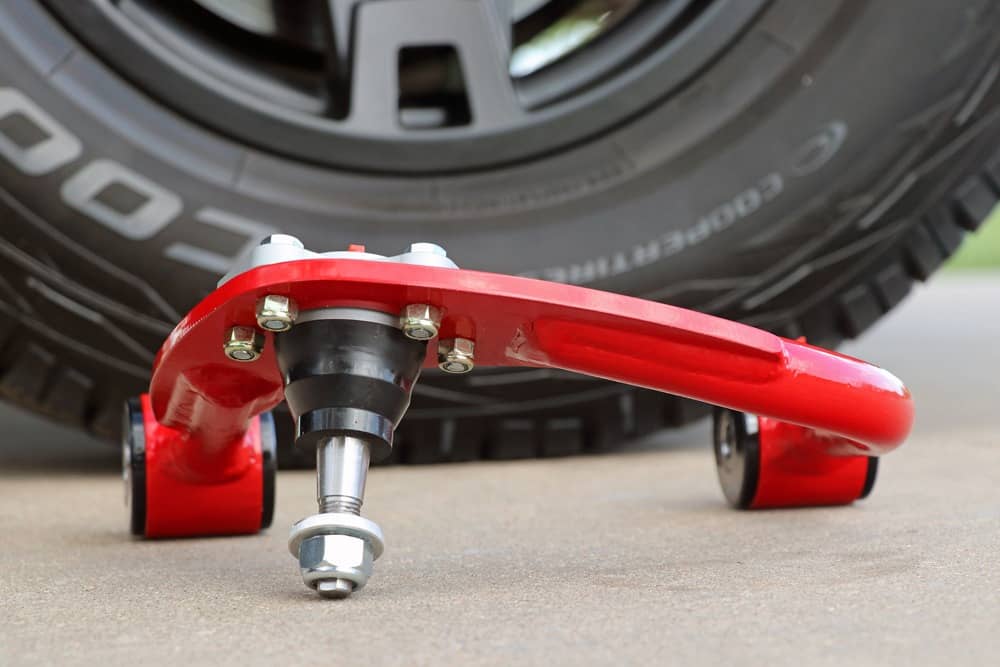
How do aftermarket upper control arms allow for more tire clearance?
Most aftermarket arms are going to have more positive caster built-in, and in many cases will be adjustable for even more positive caster. Many IFS vehicles, and especially Toyotas, will have clearance issues behind the front tires when turning. Adding positive caster will push your front tires forward gaining you more clearance from your cab mounts or anti-intrusion bars, tubs, mud flaps, and everything else behind the front tires.
What are the pros/cons of running higher caster values?
More stable steering characteristics: The wheels will have a tendency to want to track straighter and the steering will be more willing to return to center. (Higher caster values are very helpful for correcting oversteer)
Less Brake Dive: Depending on the application, and how caster is adjusted, increasing caster will also have the side effect of increasing your anti-dive geometry or the tendency for the front suspension to squat under braking.
Additional Steering Effort: Higher caster values will add more weight or effort to your steering.
Do I absolutely need an adjustable arm even if I do not have bind or alignment issues?
In many cases no, however, if you plan on pushing the limits in terms of tire fitment, it may be a good idea to run something adjustable. Many arms have high caster values built in to get the same effect of pushing the front tires forward, however, each change in one dimension of your alignment will affect another. This can sometimes make it difficult to get your camber and toe back in spec even if your caster is where you want it.
How do new UCAs allow for more travel?
The primary bind point in most stock suspension systems is the factory ball joint. Aftermarket UCAs generally come with joints with more articulation along with better geometry to minimize bind and allow for a greater range of motion.
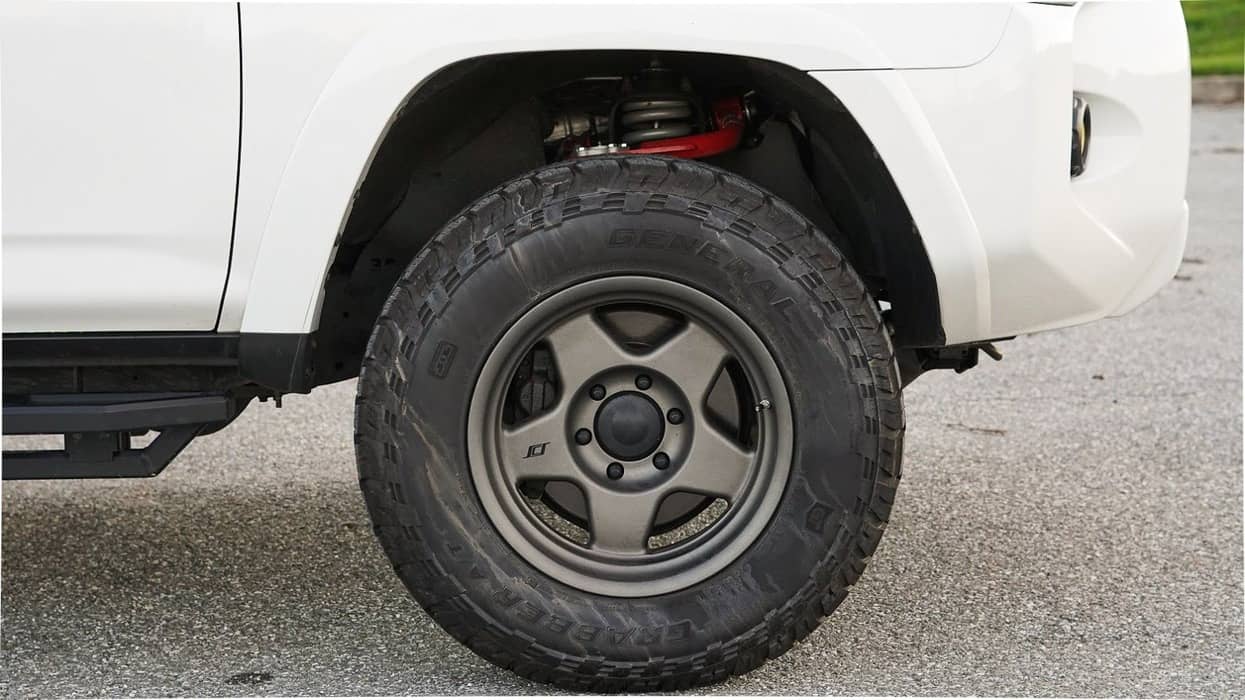
How much total lift can I correct for with most UCAs?
Most UCAs are optimized for 2-3” lifts however generally 3.5-4” of lift is the limit. With that said the more lift you have, the less droop you have, and in some cases, you may run into CV bind with lift heights above 3-3.5”.
Do I need a sealed joint?
In short no, but it certainly helps! Having a joint that is sealed means that it will be free from corrosion from the elements and additional wear from contaminants. As you might imagine, sand, mud, water, dust, and general debris do not make great lubricants so they will shorten the life of your joints. The less gunk in your joints the longer they will stay tight, quiet, and failure-free.
Why would I want/not want a uniball or heim jointed arm?
Without a doubt spherical, heim, or uniball joints provide the most potential strength compared to other joints that use rubber or another soft material to encapsulate the inside of the joint. They will have the least amount of deflection at the joint and will take the heaviest hits.
However, since there is not any rubber inside the joint, and they are very difficult to fully seal, they will require more maintenance, make more noise, transmit more NVH to the driver, and will need more regular replacement. Arms that have heim joints for the frame side mounts also generally have some adjustment for a moderate amount of additional camber and caster correction. Maybe not the best for a daily driver, however, they should be the number one choice for racers.
Why do some coilovers require aftermarket UCAs?
Many extended travel coilovers allow for more droop travel and lift than the factory arms will allow for. In some cases, larger diameter body coilovers require an aftermarket arm for adequate clearance as well.
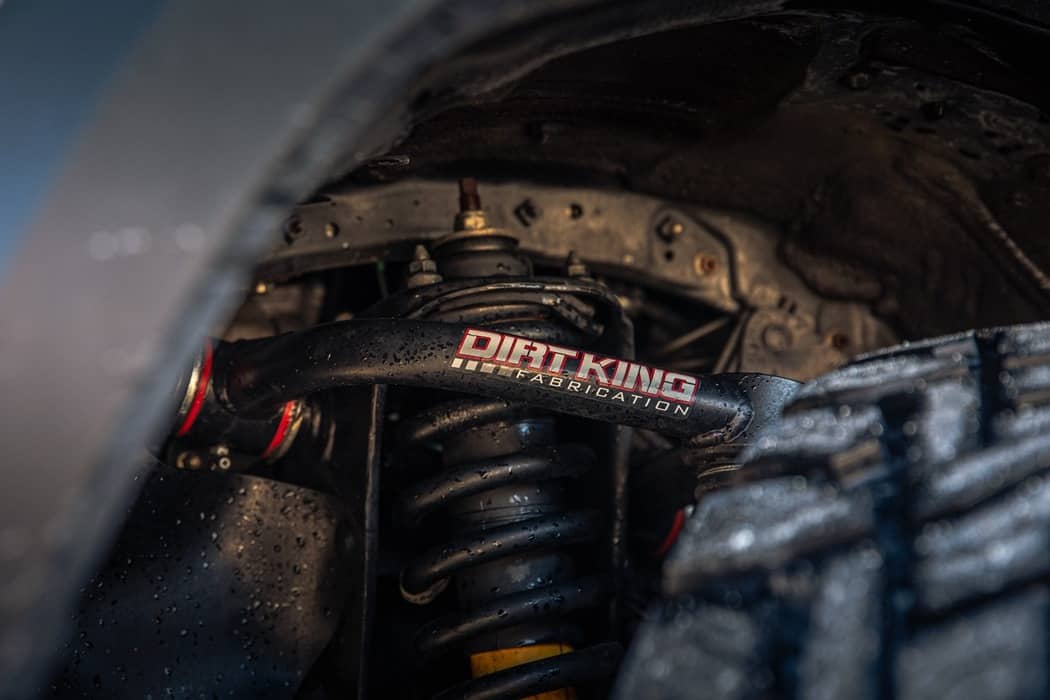
What will happen if I do not run an aftermarket UCA on extended and standard travel coilovers?
If your coilovers require an aftermarket UCA, your factory ball joints will bind before you can achieve full droop. You may not be able to fully correct your alignment for the lift the coilovers add to your vehicle either. Some 2.5” diameter body and larger coilovers will also have issues with contact with the factory arms on some applications which is not only dangerous but can also damage both the arm and the coilover.
Although many coilovers do not require an aftermarket UCA, they still may cycle more travel than the factory ball joints and arms can allow for without binding.
Furthermore, although you may be able to correct to factory alignment specifications, you may need a more aggressive caster or camber value than stock, which could be impossible given the available adjustment after you have lifted the vehicle.
In these cases, although the coilovers do not specifically require an aftermarket UCA, you would still greatly benefit from the additional caster correction and droop travel.
How do ball joint adjustable and heim adjustable arms work and how do they differ?
Arms like the SPC, Light Racing and Eibach adjustable UCAs adjust camber and caster separately at the ball joint itself. If you were to take a birds-eye view of the truck, looking straight down at the top of the arm, caster would be adjusted by pushing the ball joist fore or aft in the Y-axis, and camber is adjusted in and out in the X-axis. Since camber and caster are adjusted somewhat independently of each other, it is far easier to achieve more precise as well as more aggressive alignment specs with fewer compromises.
Additionally, as positive caster is increased at the ball joint, the kingpin or spindle angle is increased as well which will increase anti-dive geometry and minimize brake dive. One flaw of this style of adjustment is, your alignment might slip after a very hard impact, however sometimes this is a welcomed “fuse” as your alignment will often slip or go out of wack before any control arm or suspension component fails or is damaged.
Heim jointed arms like Icon and Camburgs Billet arms adjust camber and caster by lengthening or shortening the heim joints at the frame side of the upper control arms. If you were to take the same birds-eye view and look down on the top of the arm, you would see camber is adjusted by lengthening or shortening both heims at the same time, and caster is adjusted by adjusting the heims separately or oppositely of each other. For example, if you had an issue with positive camber on a Tacoma, 4runner, FJ, or Tundra, you would shorten both heims bringing the top of the wheel in.
If you wanted to add more positive caster you would lengthen the heim towards the rear of the vehicle and shorten the arm to the front. This will increase caster and push the front tires forward more, however, it will potentially add camber and toe as well. Each heim has its own lock nut or mechanism to resist unwanted movement, so once you set your alignment you almost never have to worry about it slipping, however, you will have less individual adjustment of each alignment parameter.
Since camber and caster are aligned from effectively the same place, and caster is adjusted by offsetting the arms, your adjustments with caster will have more effect on camber and toe. Without a doubt you should still be able to meet and exceed factory alignment specs, but you will have less total flexibility with your alignment compared to an arm that adjusts at the ball joint.
How to Adjust Upper Control Arms?
To achieve the best performance from your upper control arms, it's important to know how to adjust them properly. Here's a basic guide:
- Park on Level Ground: Ensure that your vehicle is on a level surface, and the wheels are straight.
- Lift the Vehicle: Use a jack to lift the front of your vehicle, allowing the wheels to hang freely.
- Access the Adjustment: Depending on your UCA design, locate the adjustment points, which may include cam bolts or slotted holes.
- Adjustment Process: Use the appropriate tools to make adjustments as needed, following the manufacturer's instructions. Typically, this involves loosening the locking nuts, making the desired adjustments, and then tightening the nuts back securely.
- Check Alignment: After making adjustments, it's crucial to check the alignment using an alignment machine or take your vehicle to a professional alignment shop to ensure it's properly aligned.
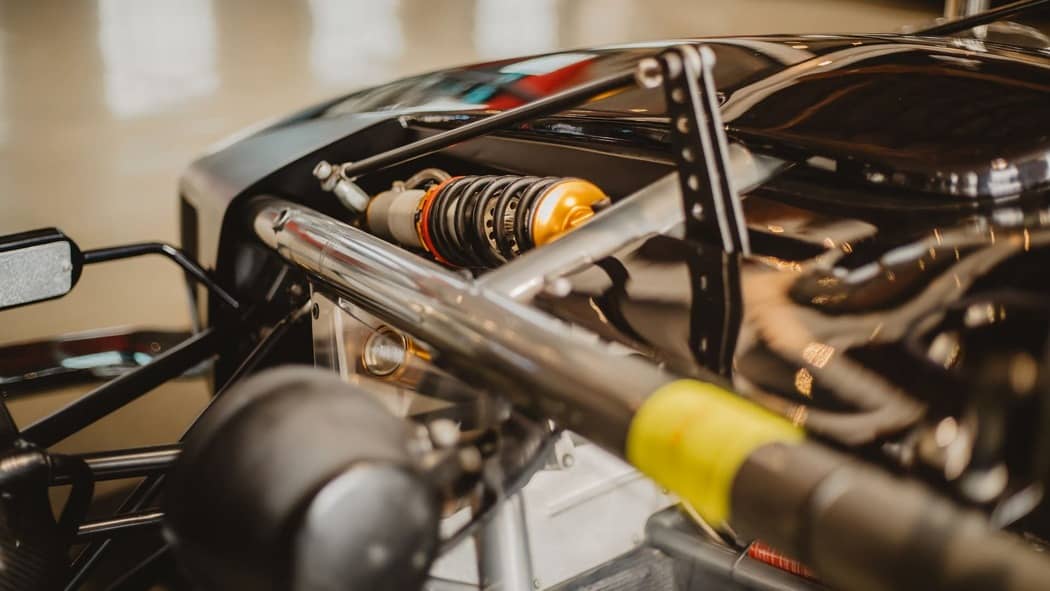
Who Makes The Best Upper Control Arms?
Selecting the best upper control arms depends on your specific needs and the type of driving you do. However, there are some common characteristics that the best UCAs share:
- Adjustability: The ability to adjust the alignment and camber angles is a key feature of high-quality UCAs. This ensures that you can fine-tune your vehicle's suspension to your liking.
- Durability: UCAs should be built to withstand the rigors of off-road driving or heavy-duty use. Look for materials like steel or billet aluminum for strength and longevity.
- Easy Installation: The best UCAs are designed for straightforward installation, reducing the need for complex modifications.
- Compatibility: Ensure that the UCAs you choose are compatible with your vehicle's make and model.
- Performance: Look for UCAs that enhance your vehicle's performance, whether you're focused on improved handling, off-road capability, or both.
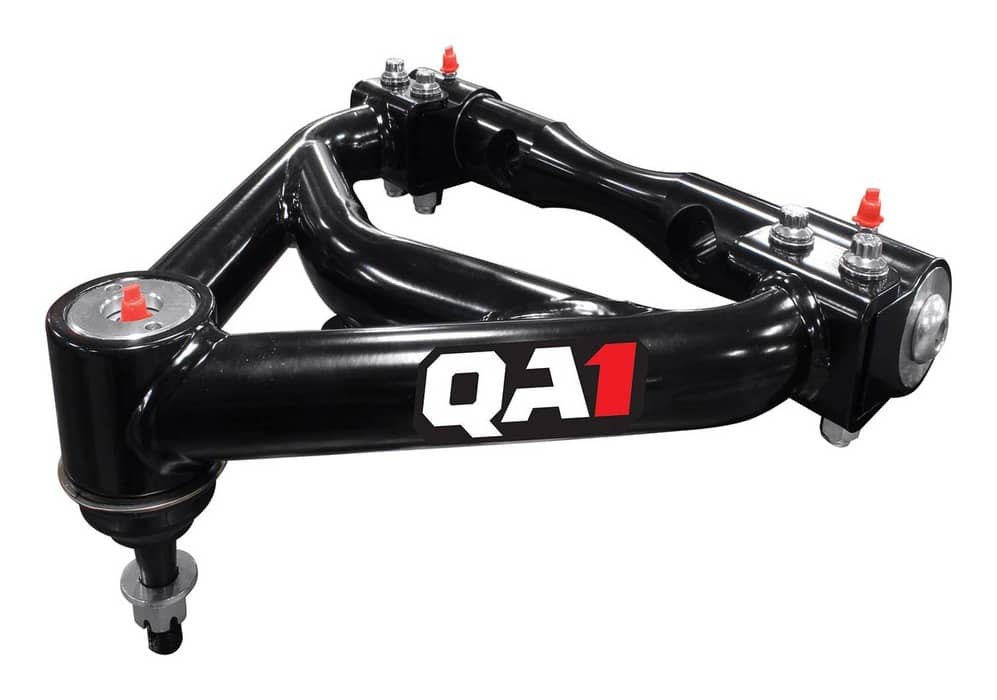
What Does the Upper Control Arm Do?
The primary functions of upper control arm can be summarized as follows:
- Maintaining Wheel Alignment: UCAs are responsible for keeping the wheels aligned correctly. This is essential for even tire wear, optimal handling, and improved safety.
- Camber Control: UCAs allow for adjustments to the camber angle. Camber refers to the tilt of the wheel, and having the correct camber angle is crucial for even tire wear and proper handling.
- Improved Handling: By controlling the suspension movement and camber angle, UCAs enhance the vehicle's handling characteristics, providing better control and stability.
- Absorption of Impact: UCAs also play a role in absorbing impacts and vibrations, making your ride more comfortable and less jarring.
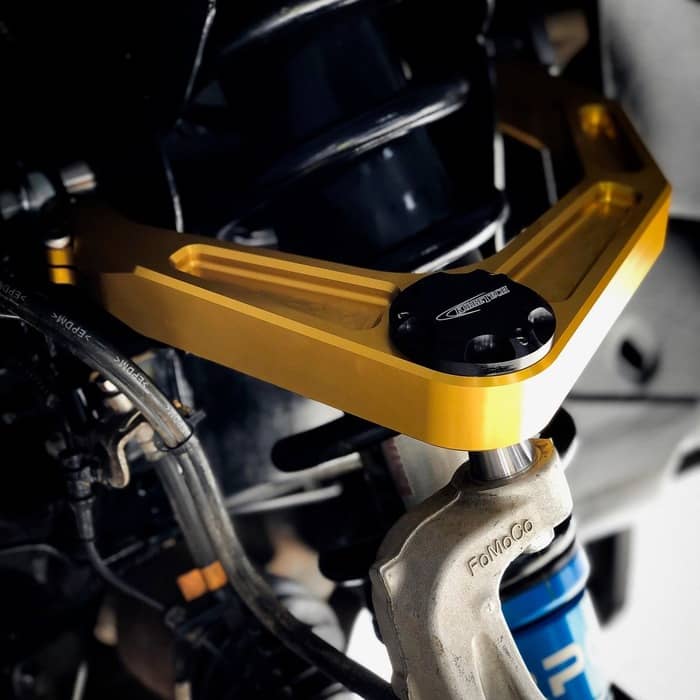
Navigate the world of suspension upgrades with Shock Surplus. Explore our Upper Control Arm Comparison Guide for informed choices and smoother rides.


